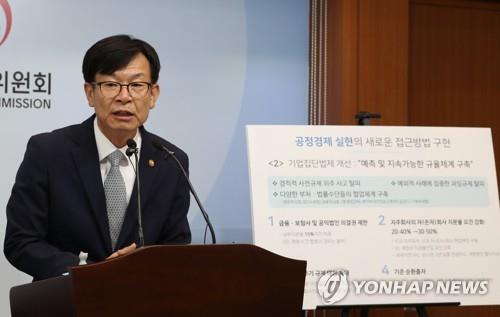South Korea's corporate watchdog said Sunday the number of conglomerate subsidiaries subject to inter-affiliate trading regulations is expected to triple under a new tighter asset standard.
The Fair Trade Commission (FTC) said it will revise the antitrust law to ban inter-affiliate trading within a business group whose founding family members hold over 20-percent stakes in both listed and unlisted companies and over 50 percent in their affiliates.
The FTC said it will also revise the standard for conglomerates under its watch from the current assets over 10 trillion won (US$8.8 billion) to 0.5 percent of the nation's gross domestic product (GDP).

The new asset rule will be implemented after the 0.5 percent of GDP exceeds 10 trillion won, which the commission expects to come between 2023 and 2024.
The corporate watchdog annually announces a newly updated list of large business groups subject to the antitrust law to oversee their equity investments or inter-affiliate loan guarantees.
Currently, a total of 231 business group affiliates are subject to inter-affiliate trading monitoring. Under the new law, the number will exceed 600, the FTC said.
The latest move came as data showed that inter-affiliate trading among companies under the family-controlled conglomerates, called chaebol, has been steadily rising.
According to the FTC, a total of 159 companies were subject to the regulations with their inter-affiliate trading reaching 7.9 trillion won (US$7.1 billion) in 2017, accounting for 11.4 percent of total transactions.
Among 203 companies, such trading has risen to reach 14 trillion won. The portion of such trading in total transactions stood at 14 percent.
Not all inter-subsidiary dealings are unlawful, but certain cases are prohibited under the antitrust law, as such practices are often used to boost the value of smaller affiliates or even paper companies set up and owned by founding family members.
The corporate watchdog said it will also give up its own right to file complaints about some major cases, such as price rigging, in a move to support effective law enforcement and better protect consumers' rights.
For the last 38 years, the FTC has been the only entity that can bring an antitrust trade case to court through the state prosecutors' office. The law is aimed at preventing a flood of lawsuits from being filed against firms by individuals and civic groups, which the business community claims could disrupt their normal operations.
"The FTC has a powerful authority in the process of antitrust regulations. If this law is not implemented in a transparent and fair manner, (the FTC) cannot earn people's trust," FTC Chairman Kim Sang-jo, a renowned former civic activist, said in a briefing. "We plan to improve the procedural regulations in line with development of South Korean society."
Under the agreement with the Justice Ministry, the FTC's exclusive complaint rights against unfair acts, such as price rigging, bidding collusion and market division, will be scrapped.
The FTC said it will collect opinions from different stakeholders in the next 40 days before submitting the revision bill to parliament for approval. (yonhap)

